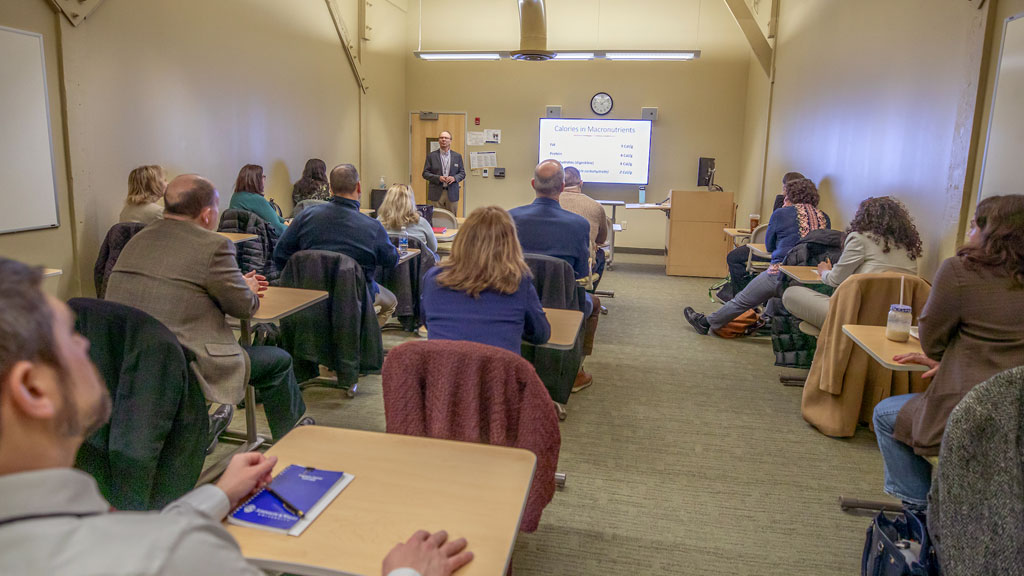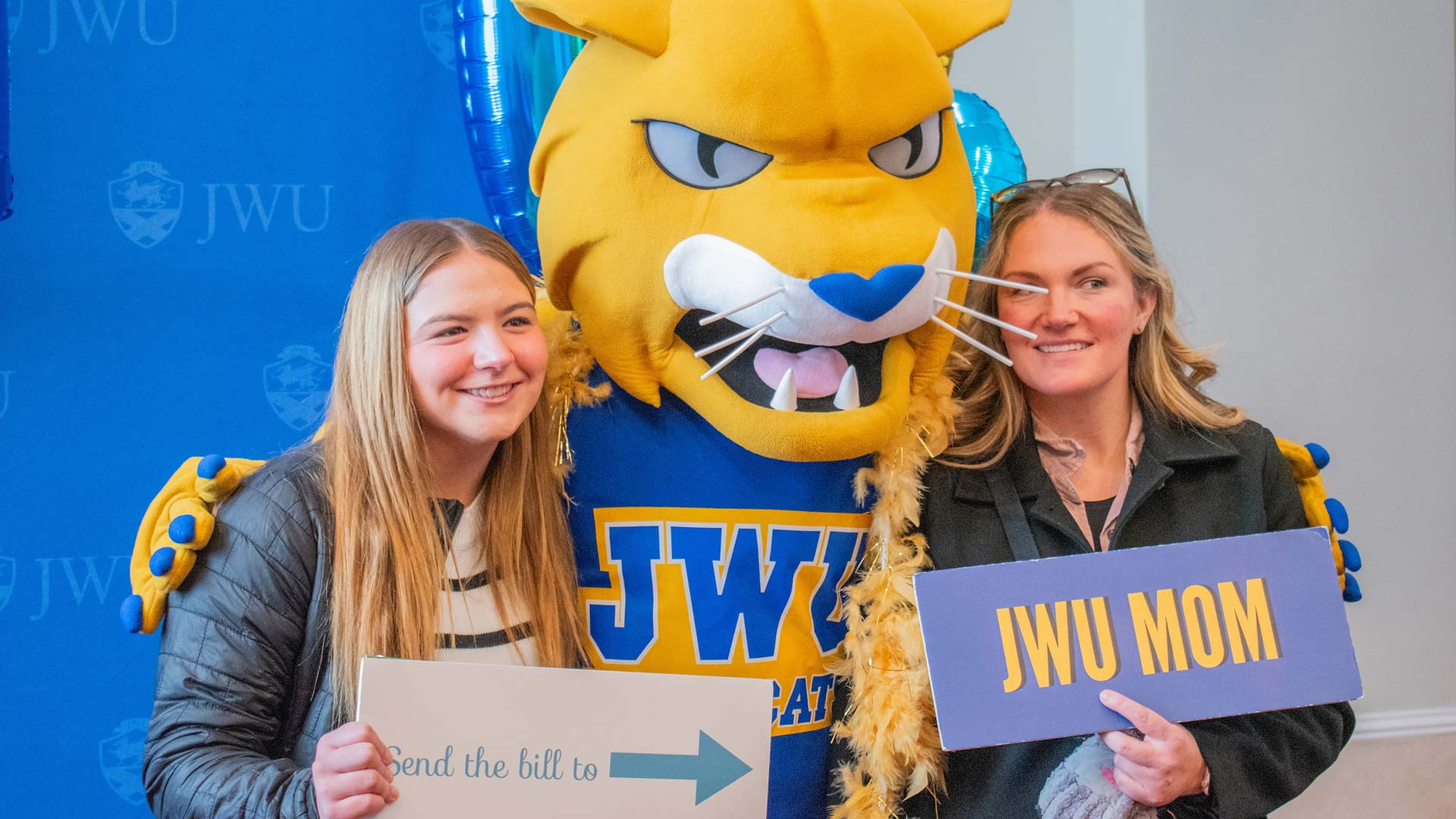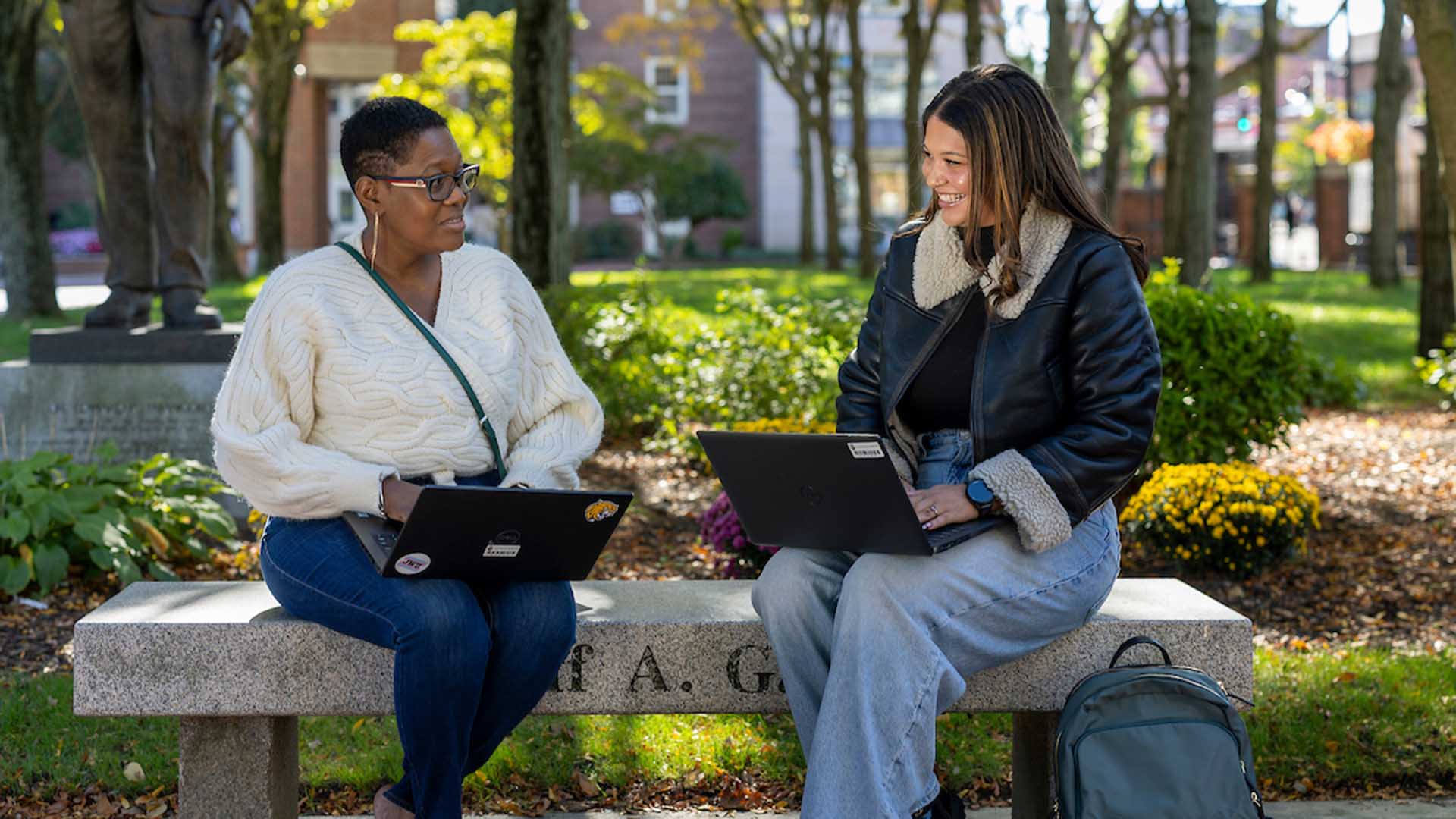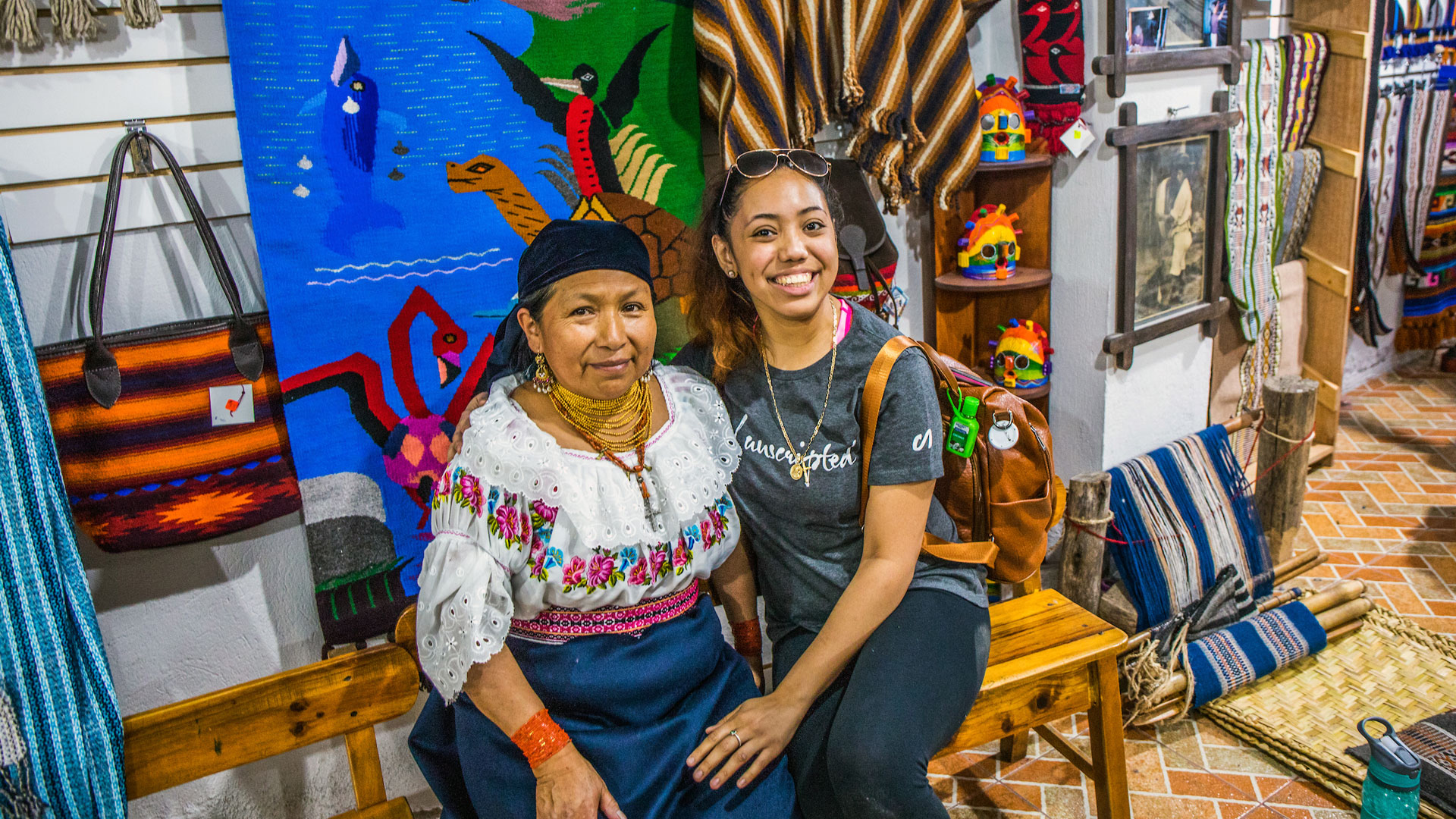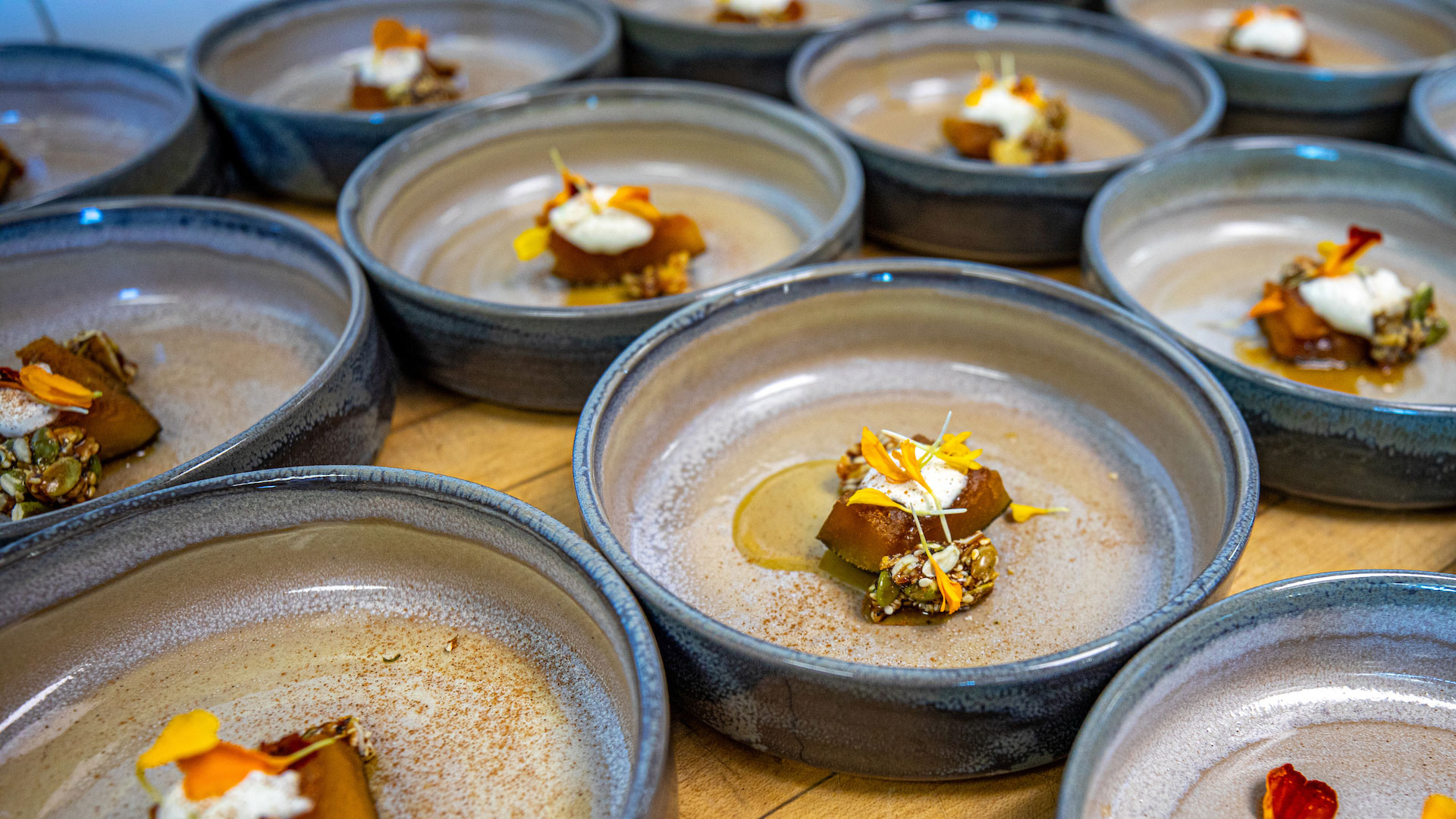Innovative Strategies for Enriching the Student Experience
Roughly 300 faculty, staff and graduate students attended the third annual University Scholarship & Best Practices Expo, which took place in Providence and Charlotte. More than 70 faculty, staff and doctoral students presented their research and best practices for advancing collective learning.
For event organizer Katrina Herold '99, '09 M.Ed., director of the Center for Teaching & Learning, the growth of the event — and the diverse cross-section of disciplines represented — is extremely exciting. “It gives folks an opportunity to disseminate the work they’re doing and really build relationships and collaborate together on projects.”
The presentations took many forms — including posters, lightning rounds, panel discussions and in-depth lectures — and incorporated a vibrant range of work, much of it focused (either directly or indirectly) on improving the student experience. Topics included:
- innovative ways to integrate Artificial Intelligence (AI)
- department-specific scholarship
- diversity, equity, inclusion and belonging
- improving overall mental health and well-being
The Ripple Effect of Kindness
In his keynote address, Assistant Provost for Student Achievement Dameian Slocum '00, '21 focused on the intersection of inclusion and well-being — specifically, how kindness, close listening and mutual understanding from the greater JWU community can help propel students through the lifecycle of their JWU experience.
Slocum drew on his long career at JWU (including his time as a student) to share his own experience of firsts — first in his family to go to college, then grad school. He explained that he didn’t always know how to ask for help: “That’s the other thing about being first; you didn’t know where all the potholes were,” he noted. The process of finding his support system was gradual but crucial, and it kept him moving forward.
“So don’t think little things don’t matter, because all of the experiences I had here, from being an undergraduate student to this very day … and the ripple effect of kindness has led me to be where I can be to speak back to you.”
“We have incredibly talented people. It reaffirms what I’ve always known and experienced as a student: that people care a great deal about the work they do and the students we serve.”
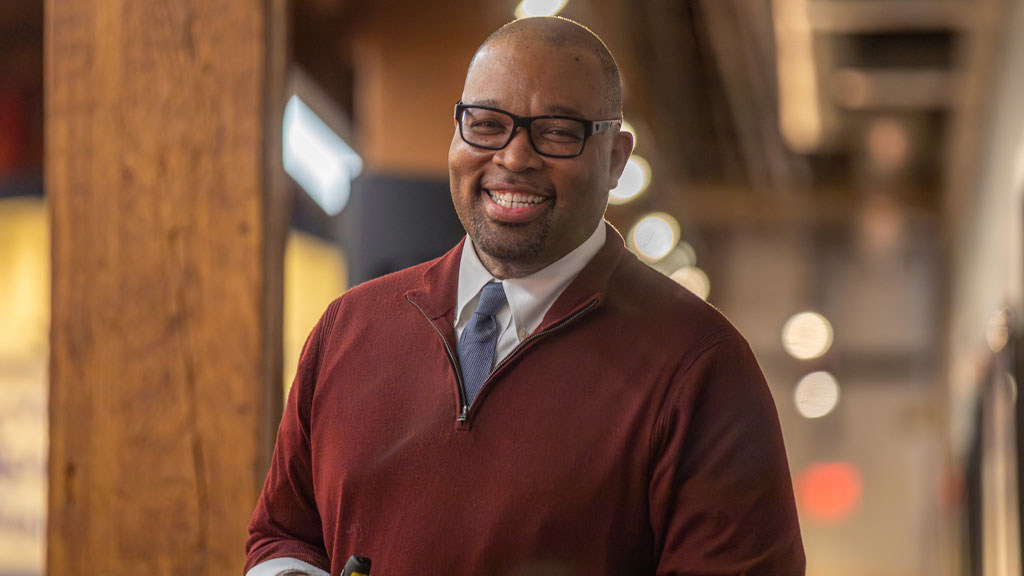
Dameian Slocum at the Best Practices Expo.
Improving Student Learning Outcomes
Many sessions showcased research or project-based work with the potential to benefit students.
Arts & Sciences Professor Estelle Lebeau’s research focused on ways to improve student learning outcomes in the university’s general chemistry courses.
In what Lebeau called “recitation sessions,” faculty would model for the students how to do chemistry problems, how to approach the material and how to work the problems. Results from Lebeau’s study show improved student-learning outcomes and retention for students attending a majority of the faculty-led problem sessions. “Students retain the material a lot better, as evidenced by their final exams course, which are cumulative,” Lebeau reported. “Our students who are attending the recitations are doing a lot better retaining the material their overall course scores.”
Lebeau’s study began as personal research but became formalized through a one-year grant from the National Science Foundation. The study is being expanded to other disciplines, like algebra classes. “In those traditionally difficult courses, we as an institution are working to support our students, meet them where they are and help bring them forward so they can achieve their dreams, which for my students is often medical school, PA school events, school, and so forth,” Lebeau noted. “Helping them succeed in their classes benefits their life goals.”
Expanding Skills through Community Service
Arts & Sciences professors Jonathan Mosko, Terry Novak and Jessica Fede served as panelists on a discussion about bringing service learning to life at JWU and how students over the years have benefitted from nonprofit work ranging from helping in schools, meal kitchens, nursing homes and more.
Mosko has brought Psychology and English students to Steere House Nursing & Rehabilitation Center in Providence, while Fede is running a Directed Experiential Education (DEE) project at Better Lives RI, a nonprofit providing a food pantry, community meals and homeless outreach.
As part of the Better Lives DEE, students take varying shifts:
- Monday mornings on the food truck, providing help to clients who come to get food
- Tuesdays or Wednesdays for in-office work
- Fridays for the community meal site
Students must cycle through all shifts at least once to experience different facets of the agency.
In addition to their shift work, students have been proactive and resourceful in other ways. One student built an Ikea shelf so clients could start a free book swap. Another student organized a clothing collection. And another student noticed some clients bringing their children to the food truck, so they wrote up a proposal and a budget and organized a student group to put together care packages to distribute.
“Our students really love the hands-on component of service learning,” Novak summarized. “They can grow new skills through community service, which can help them stand out from other students when applying to grad school or jobs, and they are always willing to identify new ways to help others. One student even downloaded Duolingo so they could communicate with Spanish-speaking clients!”
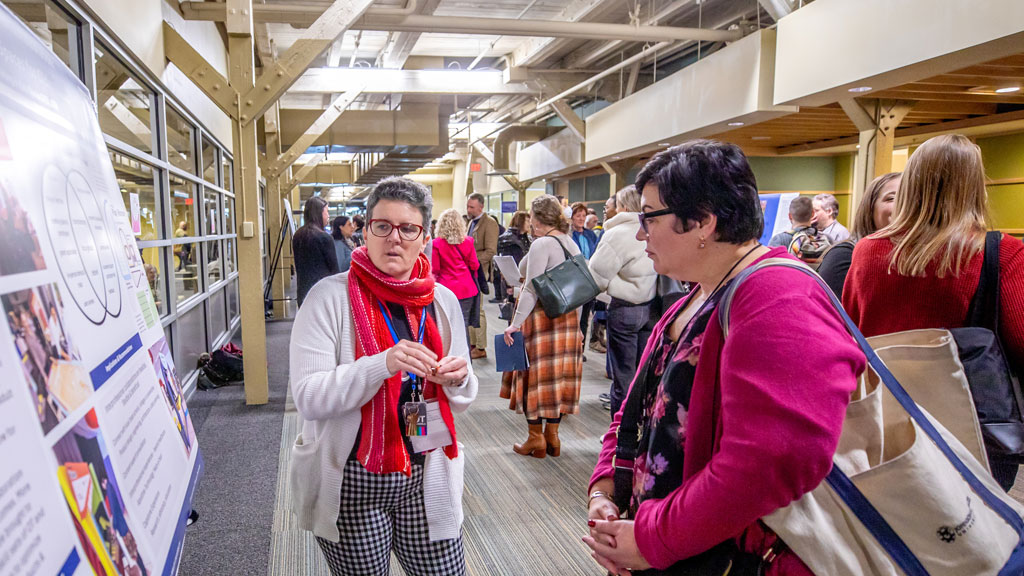
Leveraging Professional Networks to Benefit Students
Associate Professor Megan Stoessel presented on the benefits of practice and professional relationships to experiential education. Stoessell, who has written for The Boston Globe for over 20 years, shared how she approached and involved the Globe’s Providence bureau chief in creating a Direct Experiential Education (DEE) that provided her students with an opportunity to get published in a national newspaper and to leave with clips in hand.
The chief, Lylah Alphonse, is a well-respected editor, and Stoessell was grateful that Alphonse not only agreed to hear Stoessell out, but even expanded the DEE so that students would write two, instead of just one, interview pieces.
Stoessell’s DEE cohort consisted of eight students from various disciplines, and she vetted each of them to ensure she could count on them to perform at a level worthy of the Globe. She helped them work on writing, conversational tone and editing their interviews. They sent the editor three stories in order to have just one chosen, so they needed to learn to have tough skin; if their story didn’t work out, they had to pitch to the editor again. Stoessell praised her DEE students for bringing story ideas on supper clubs, food trucks and underground places that even Globe staff didn’t know about, showing their knowledge of the culture around them.
Now the students have been able to walk away with bylines in one of the Northeast’s most respected publications, giving them a leg up over students who will be graduating from peer institutions like Emerson, Northeastern and Boston University and applying for similar writing jobs. One DEE student has even arranged becoming a freelance writer for the Globe while still a JWU student.
Attendees of Stoessell’s expo session, nearly all faculty members, were quick to brainstorm and share ideas for their own DEEs or classroom assignments in their respective fields, with a goal of using their networks to better prepare graduates during their time on campus. When asked if she would have attempted to pitch this idea without already having a Globe connection, Stoessell responded that she contacts people cold all the time. “If you’re thinking about organizations, focus on those with small staffs or who have recently suffered layoffs, as it can be mutually beneficial to have students doing work for them,” she advised her colleagues.
From Research to the Real World
Learning at JWU is an immersive experience, and faculty consistently connect their class lectures to vivid real-world examples.
Take Assistant Professor Nick Hamdi, Ph.D., RDN, LDN’s Community Nutrition (DIET 3080) course, which integrates data from his research project, “Formative Evaluation of a Pediatric Clinical Community Food Insecurity Program,” along with stats from the Rhode Island Community Food Bank, to illustrate food insecurity: “We also use the project as a concrete example when we have course discussions on community needs assessments and nutrition education.”
Hamdi also offers opportunities for current and previous students in the class to assist with his ongoing research, which currently includes developing a program to support adequate mealtimes in the Boston and Newport public school districts and designing a culturally respectful culinary education program for Latinas with prediabetes.
Animal Science program chair Jackie Bowser, DVM, has worked with CFIT’s Russ Zito and Kristoph Bruehwiler to get students involved with caring for the 19 hens living in a luxe custom-built henhouse dubbed “the Coop-a-Cabana.”
Bowser is one of the faculty members who oversees Institutional Animal Care & Use Committee (IACUC), a set of best practices to ensure that animal use at the university meets or exceeds a set of scientific and ethical considerations. These include teaching protocols identifying safe treatment of the animals; regular monitoring of their care, feeding and overall health; and other considerations.
In practice, this means that students learn the patience and care that goes into keeping “the ladies” (as the hens are collectively known) happy and well-fed. Zito’s culinary classes store up their veggie scraps to boost quality yolk production; Bowser and Zito’s students also trade off on caring for the chickens each day. “The students absolutely love it,” Bowser noted.
Along the way, students are learning crucial lessons about the resource-intensiveness of growing high-quality food. “Animal Science students will figure out what types of diets can change the quality of the eggs and the CFIT students will get to see how the quality impacts the final product of what they’re making,” said Bowser.
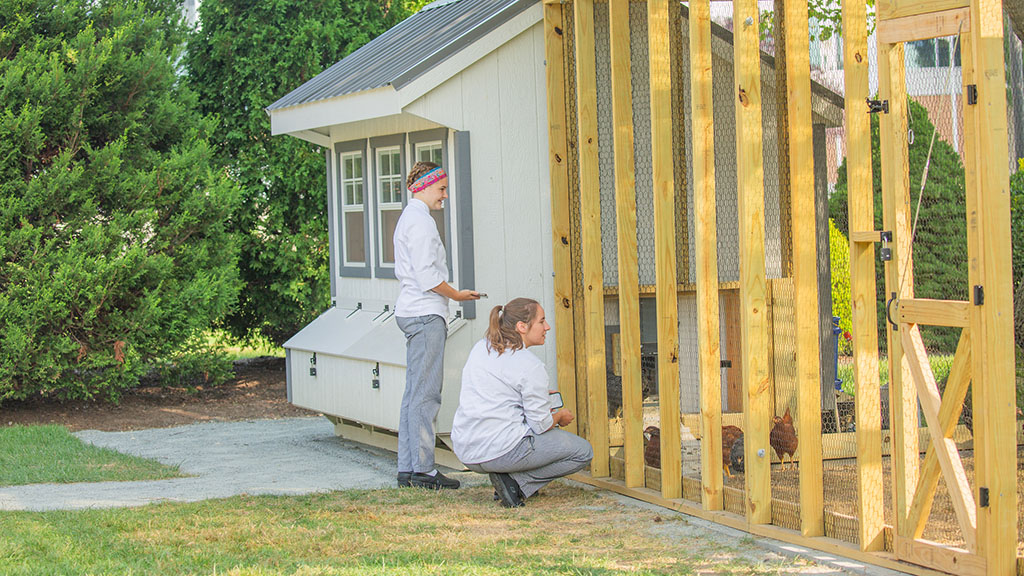
Two culinary students at the Coop-a-cabana.
United by Passionate Expertise
No matter how broad their areas of interest, JWU’s diverse faculty are united by their passion for sharing their knowledge.
“We have incredibly talented people,” Dameian Slocum concluded in his keynote. “It reaffirms what I’ve always known and experienced as a student: that people care a great deal about the work they do and the students we serve. Every year I walk away knowing that our students are in great hands.”
